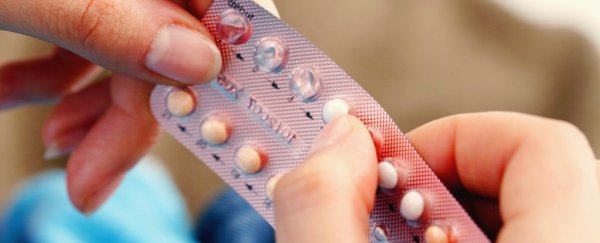Women on hormonal contraceptives such as the pill are at a higher risk of being diagnosed with depression, and more likely to be prescribed antidepressants than their peers, a new study has found.
And the risk is particularly high for teenagers - researchers found that the likelihood of being prescribed antidepressants increased up to 80 percent in girls aged 15 to 19 who were taking the pill, and the risk tripled in some using other forms of hormonal contraceptive, such as IUDs.
Millions of woman worldwide use hormonal contraceptives, which include everything from the pill (known technically as the combined oral contraceptive pill), the mini pill (the progesterone-only pill), hormonal IUDs (intrauterine devices), and the birth control patch.
And now a new study from the University of Copenhagen in Denmark has found evidence that the hormones used in all these devices, such as progesterone, can have a noticeable effect on a person's mood.
"Use of hormonal contraception, especially among adolescents, was associated with subsequent use of antidepressants and a first diagnosis of depression, suggesting depression as a potential adverse effect of hormonal contraceptive use," the researchers concluded in their paper.
The link between depression and the pill has been reported anecdotally for years, but this is the largest study to date that provides clear evidence for the association.
The researchers looked at data collected between 2000 and 2013 using the Danish version of social security numbers to track prescriptions and diagnoses in the female population aged between 15 and 34, giving them a cohort of 1,061,997 women to analyse.
They estimated that 55 percent of the participants were currently or recently using hormonal contraception.
Among this 55 percent, the risk of being diagnosed for depression increased at least 20 percent across all of the hormonal contraceptives analysed.
For the pill, woman aged 15 to 34 were, on average, 23 percent more likely to have antidepressants prescribed by their doctor, and for the mini pill, the risk increased to 34 percent.
The big concern here is for teenagers taking hormonal contraceptives, with the pill increasing their depression risk by 80 percent, and all other forms of hormonal contraceptives, such as the mini-pill and IUDs, doubling or tripling the risk of depression within that age group.
The strength of this study isn't just in its massive data set. Because it's based on health records, it means the researchers didn't have to rely on the participants' memory regarding prescriptions and usage, or self-reporting and general mood surveys to determine depression risk.
But before you panic, studies in the past have shown mixed results when it came to mood changes and contraceptives.
In this 2010 study, there was only a small link shown, but in this 2007 study, there was no change in mood at all. And this study from 2011 even showed a positive increase in moods when on the pill.
So what's going on here? Well the main thing to keep in mind is that the Denmark study - and many others in the past - haven't been able to show causation. That means there's no biological evidence to show that it's the pill that's increasing a person's depression risk.
For example, it could be that certain factors that are leading teenagers to contraceptive use are what's behind the depression risk, not the contraceptives themselves.
"The possibility that this link between love, sex (contraception), and feeling depressed is strengthened by the fact that the contraception-depression link was strongest in adolescents, those who are at the developmental stage where trying to find a romantic partner is paramount," Catherine Monk, an expert in psychiatry and gynaecology at Columbia University Medical Centre, who wasn't involved in the research, told Anna Almendrala at the Huffington Post.
More research is needed to get to the bottom of the apparent link between the pill and depression, but the important point here is that doctors and those taking the pill should be aware that mood changes could be a real possibility when starting a hormonal medication (or any type of medication at all).
If depressive symptoms arise, it's a good idea to look at the contraceptives you're using and assess with your doctor.
As Channa Jayasena, a reproductive endocrinologist from the Imperial College London, who was not involved in the study, told The Guardian:
"This study raises important questions about the pill. … The study does not prove that the pill plays any role in the development of depression. However, we know hormones play a hugely important role in regulating human behaviour."
"Given the enormous size of this study, further work is needed to see if these results can be repeated in other populations, and to determine possible biological mechanisms which might underlie any possible link between the pill and depression."
The research has been published in JAMA Psychiatry.
